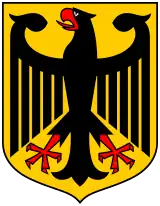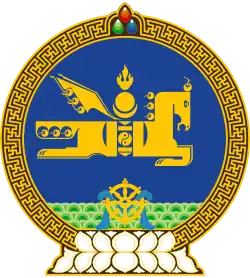Germany–Mongolia relations
Germany–Mongolia relations are the bilateral relations between Germany and Mongolia. Historically, the Mongolian People's Republic had close ties to the German Democratic Republic, which has persisted to this day.[1] Mongolia established ties with the Federal Republic of Germany in 1974.[2]
.png.webp) | |
Germany |
Mongolia |
|---|---|
| Diplomatic mission | |
| Embassy of Germany, Ulaanbaatar | Embassy of Mongolia, Berlin |
History
Early contacts
The earliest contact between Germanic and Mongol peoples are said to have occurred in 1241, during the Battle of Legnica, with the Mongols under Baidar proving victorious over a combined force of Poles, Moravians, and Germans, though the Mongols retreated back to Hungary shortly after.[3]
20th century
After declaring independence in 1911, Mongolia had made ultimately unsuccessful overtures to establish ties with Germany through its representative in Saint Petersburg.[4] After the Mongolian Revolution of 1921, the Mongolian People's Party made establishing economic ties with Germany a high priority, and in 1927 the first batch of 50 Mongolian students, including Dashdorjiin Natsagdorj, the founding father of modern Mongolian literature, were sent to Germany and France for education.
East Germany
Mongolia and East Germany established ties on April 13, 1950.[5] The following high-level visits were undertaken between nations.
In 1989, about 300 exhibits from Mongolian museums were organized in Munich, dedicated to the "art and culture of the Mongolian equestrian people".[6]
Post-communist era
Since the German reunification, a large number of visits have been held by various high-ranking German and Mongolian politicians and delegations. The following is a list of the most important state visits since 1990:[9]
| Year | Person | Office | Place |
|---|---|---|---|
| September 1990 | Regierungsdelegation | Delegation from the Federal Ministry for Economic Cooperation and Development | Ulaanbaatar |
| June 1991 | Tserenpil Gombosuren[10] | Mongolian Foreign Minister | Berlin |
| September 1991 | Dieter-Julius Cronenberg | Vice President of the German Bundestag | Ulaanbaatar |
| February 1992 | Dashiin Byambasüren | Prime Minister of Mongolia | Berlin |
| August 1992 | Carl-Dieter Spranger | Federal Minister for Economic Cooperation and Development | Berlin |
| January 1993 | Natsagiin Bagabandi | Mongolian Speaker of Parliament | Berlin |
| November 1994 | Lkhamsuren Enebisch | Deputy Prime Minister | Berlin |
| December 1994 | Chojisuren Purevdorj | Deputy Prime Minister | Berlin |
| July 1995 | Burkhard Hirsch | Vice President of the German Bundestag | Ulaanbaatar |
| September 1995 | Punsalmaagiin Ochirbat | President of Mongolia | Berlin |
| February 1996 | Chojisuren Purevdorj | Deputy Prime Minister | Berlin |
| September 1996 | Klaus Kinkel | Federal Minister of Foreign Affairs | Ulaanbaatar |
| October 1996 | Radnaasumberel Gonchigdorj | Mongolian Speaker of Parliament | Berlin |
| September 1997 | Shukher Altangerel | Mongolian Foreign Minister | Berlin |
| 2000 | Natsagiin Bagabandi | Mongolian President | Berlin |
| 2011 | Angela Merkel | German Chancellor | Ulaanbaatar |
| 2012 | Tsakhiagiin Elbegdorj | Mongolian President | Berlin |
| 2015 | Tsakhiagiin Elbegdorj | Mongolian President | Berlin |
| 2022 | Luvsannamsrain Oyun-Erdene | Prime Minister of Mongolia | Berlin |
Cultural relations
From May to June 1995, the mixed German-Mongolian culture commission met in Ulaanbaatar under the direction of Peter Truhart.[11] On September 16, 1997, an agreement on cultural exchange and cooperation was signed between Germany and Mongolia.[12]
Agreements
On August 22, 1994, Germany and Mongolia passed a double taxation agreement in order to avoid double taxation of German and Mongolian citizens.[13] A year later, in October 1995, the two countries signed a financial cooperation agreement. A delegation from the Committee on Economic Cooperation and Development of the German Bundestag traveled to Mongolia in March 1998.
Trade
Germany is Mongolia's main trading partner in the European Union, together with the United Kingdom, but on January 31, 2020 the United Kingdom left the EU.[1]
In 2022, to reduce Germany's reliance on critical minerals from Russia and China, Chancellor Olaf Scholtz conveyed to visiting Prime Minister of Mongolia Luvsannamsrain Oyun-Erdene that Germany aims to buy raw materials from Mongolia, including copper and rare earths.[14]
Diaspora
In the 2010 Mongolian National Census, 3,852 Mongolian citizens were recorded to have been living in Germany.[15]
References
- "Mongolia". Federal Foreign Office. Retrieved 22 August 2017.
- "Germany and Mongolia: 40 years of close partnership". German Federal Foreign Office. Retrieved 3 January 2021.
- Bettina Ehlers: Kompendium der deutsch-mongolischen Beziehungen (Hamburg 2000, S. 40, siehe Literatur)
- Sanders, Alan (1996). Historical Dictionary of Mongolia. Rowman & Littlefield. p. 368. ISBN 9781538102275. Retrieved 22 August 2017.
- "Улс төрийн харилцаа". Монгол улсаас Герман улсад суугаа элчих сайдын яам. Retrieved 22 August 2017.
- Prause, Gerbard, Reich der Reiter. Die hohe Kultur eines alten Volkes, Die Zeit 13 October 1989, retrieved 27 January 2016.
- "ХХI зууны Монгол-Германы харилцааг гэрэлтэй, өөдрөгөөр төсөөлдөг". mass.mn. Retrieved 2021-06-22.
- "Монгол, Германы дипломат харилцааны 40 жилийн ойд зориулсан арга хэмжээ болов". www.mglnews.mn (in Mongolian). Retrieved 2021-06-22.
- "МОНГОЛ УЛСААС ХОЛБООНЫ БҮГД НАЙРАМДАХ ГЕРМАН УЛСАД СУУГАА ЭЛЧИН САЙДЫН ЯАМ, EMBASSY OF MONGOLIA IN THE FEDERAL REPUBLIC OF GERMANY". berlin.embassy.mn. Retrieved 2021-06-22.
- Der mongolische Außenminister Tserenpil Gombosuren wurde vom Präsident der Industrie- und Handelskammer der Mongolei Sed-Ochir Bayarbaatar begleitet (Bettina Ehlers: Kompendium der deutsch-mongolischen Beziehungen, Hamburg 2000, vgl. S. 43, siehe Literatur)
- Bundesanzeiger: "Bekanntmachung des deutsch-mongolischen Abkommens über kulturelle Zusammenarbeit 29 July 1998" (PDF). Archived from the original on 2016-01-27. Retrieved 2021-06-22.
{{cite web}}: CS1 maint: bot: original URL status unknown (link), retrieved 27 January 2016. - Bundesanzeiger: "Bekanntmachung des deutsch-mongolischen Abkommens über kulturelle Zusammenarbeit 29 July 1998" (PDF). Archived from the original on 2016-01-27. Retrieved 2021-06-22.
{{cite web}}: CS1 maint: bot: original URL status unknown (link), retrieved 27 January 2016. - Internationales Steuerrecht – Doppelbesteuerungsabkommen Mongolei, retrieved 27 January 2016.
- "Germany Seeks Critical Minerals from Mongolia To Reduce Dependency on China". Mongolia Weekly. 2022-10-17. Retrieved 2023-08-22.
- "ХҮН АМ, ОРОН СУУЦНЫ 2010 ОНЫ УЛСЫН ТООЛЛОГЫН ҮР ДҮН" (PDF). National Statistics Office of Mongolia. Retrieved 21 August 2017.

